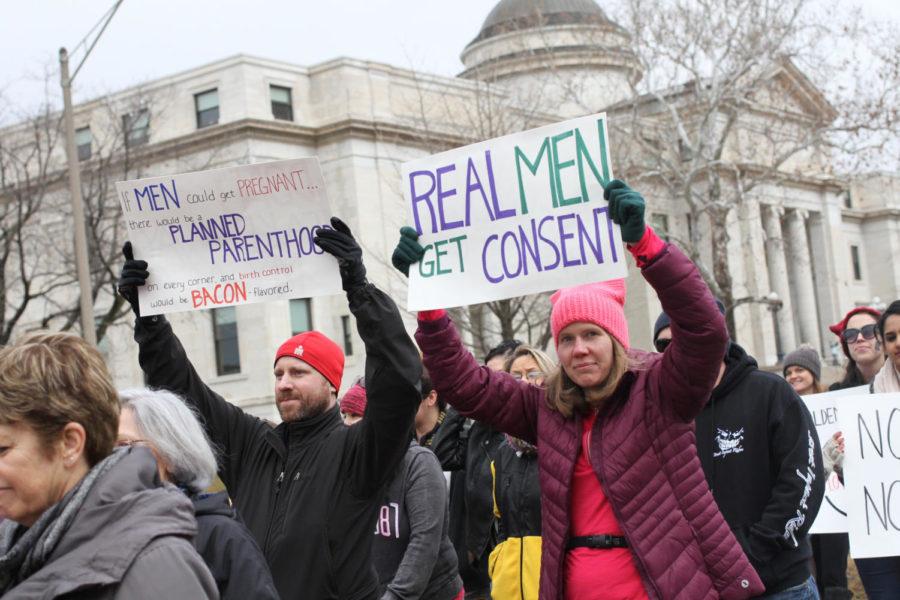Salo: Women’s (almost) equality day
Protesters hold signs that read, “If men could get pregnant there would be a Planned Parenthood on every corner and birth control would be bacon flavored,” and, “real men get consent,” during the Women’s March in Des Moines on Saturday. Thousands of men and women circled the Iowa State Capitol to raise awareness for women’s issues.
August 23, 2017
Women’s Equality Day will be celebrated across the U.S. tomorrow, on the 97th anniversary of the day that the 19th Amendment was added to the Constitution.
For those who slept through their high school history class, the 19th Amendment was the amendment that gave women the right to vote. The small print in this amendment restricted ‘women’ to white women. Later, on Aug. 6, 1965, Congress passed the Voting Rights Act which allowed all U.S. citizens to contribute to society by casting their votes.
Since 1920, women have made great strides in fighting for their equality – from basic rights to health care, education and working conditions, to doing their part to lead our country as CEOs, political figures and even presidential nominees.
However, there is still work to be done to work toward total equality. Although women are, for the most part, no longer viewed as baby machines, that doesn’t mean life is perfect for American women. As Americans, we need to remember this and do our part to make true equality a reality.
The wage gap is one issue that advocates for women continue to fight against. Yes, the gap is smaller after the Equal Pay Act of 1963, but there is still a gap largely due to motherhood. So, sorry ladies, you have to choose between making your fair wage or populating the earth.
Women are also underrepresented in politics and leadership roles in general, more likely to be the victim of domestic assault and are at risk of losing their access to abortion and birth control.
In the U.S., 1 in 5 women report being raped in their lifetime. Although the rates of female sexual assault victims has dropped 64 percent from 1995, the issue is far from being resolved.
Janae Due, the equity and social justice coordinator for the Margaret Sloss Women’s Center on campus, said that sexual assault is one of the biggest issues for women on campus today.
“It’s not just assault or harassment like catcalling,” Due said. “It’s also benevolent sexism… when women are seen as lesser human beings which is still prevalent today.”
She said that in order to deal with women’s issues on campus, faculty and students both need to be committed to fixing the problem.
“Instead of 50/50, faculty and staff need to give 100 percent in order to help students, and students have to give 100 percent to help themselves,” Due said.
No matter how much work we have to go, Women’s Equality Day is a great opportunity to celebrate our nation’s women. And who knows, maybe by the 100th anniversary, everyone will truly be equal.
As for this year, the women’s center will be at the Carrie Chapman Catt Center to hear what issues are most important to students.
For more information on women’s resources on campus, visit the Margaret Sloss Women’s Center or their website.







